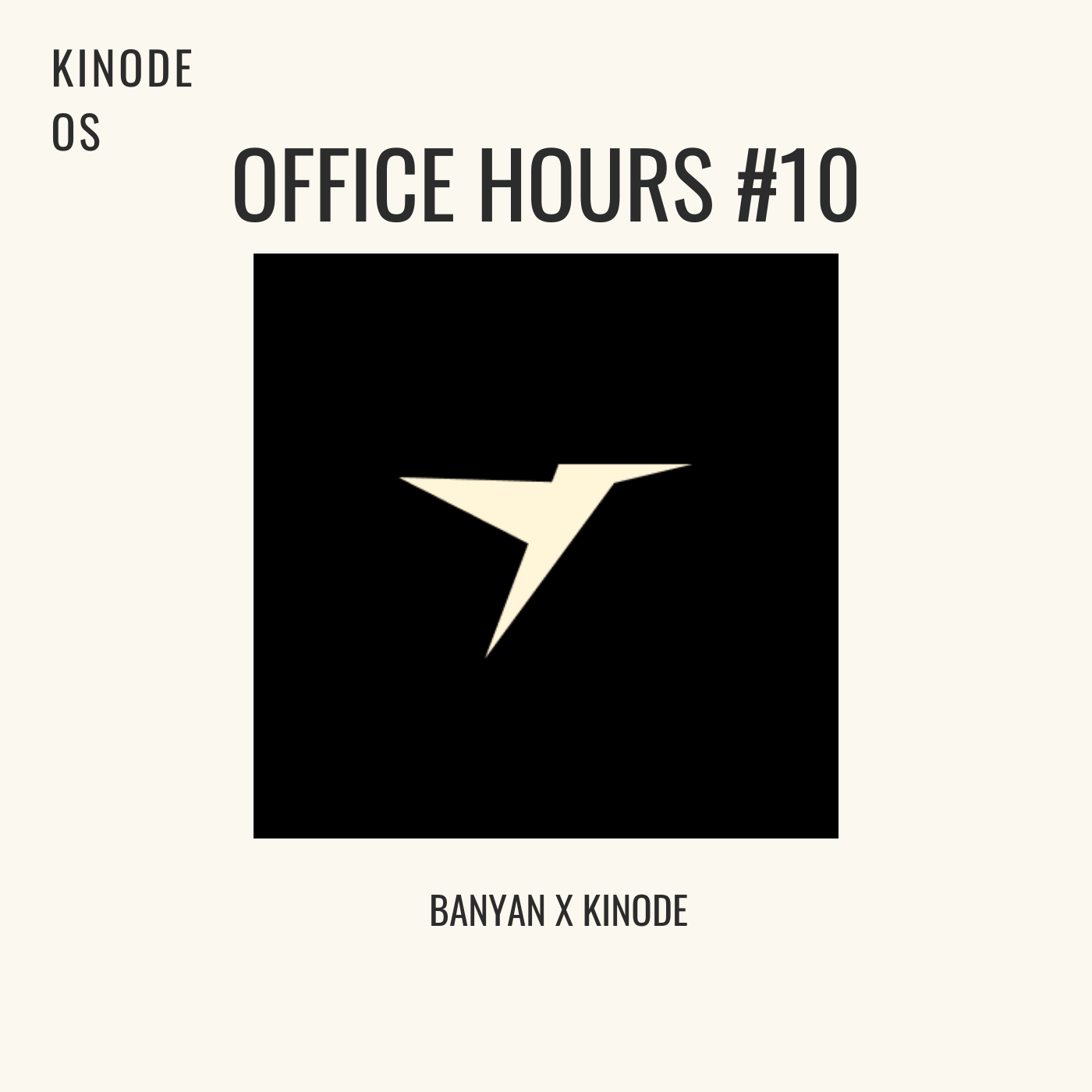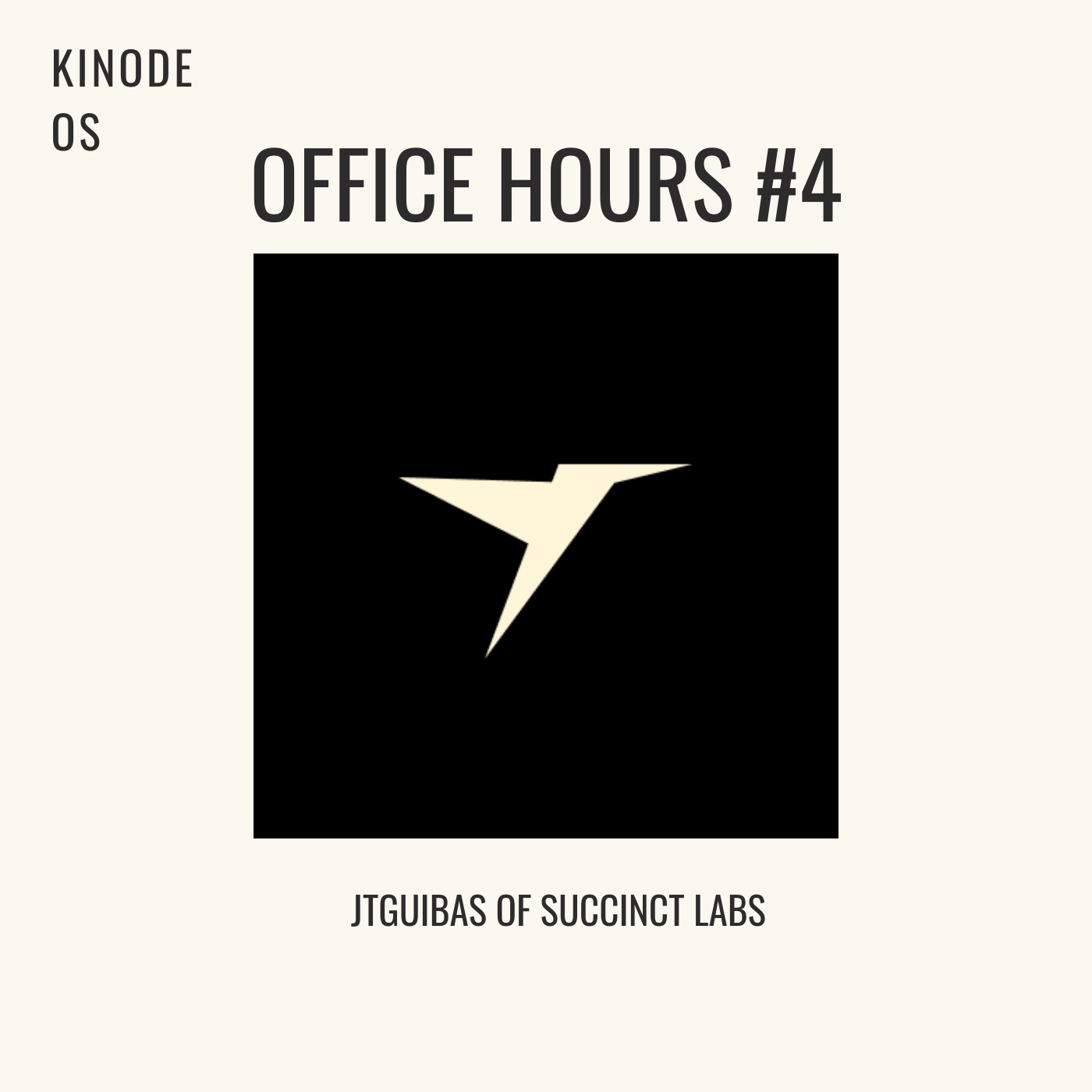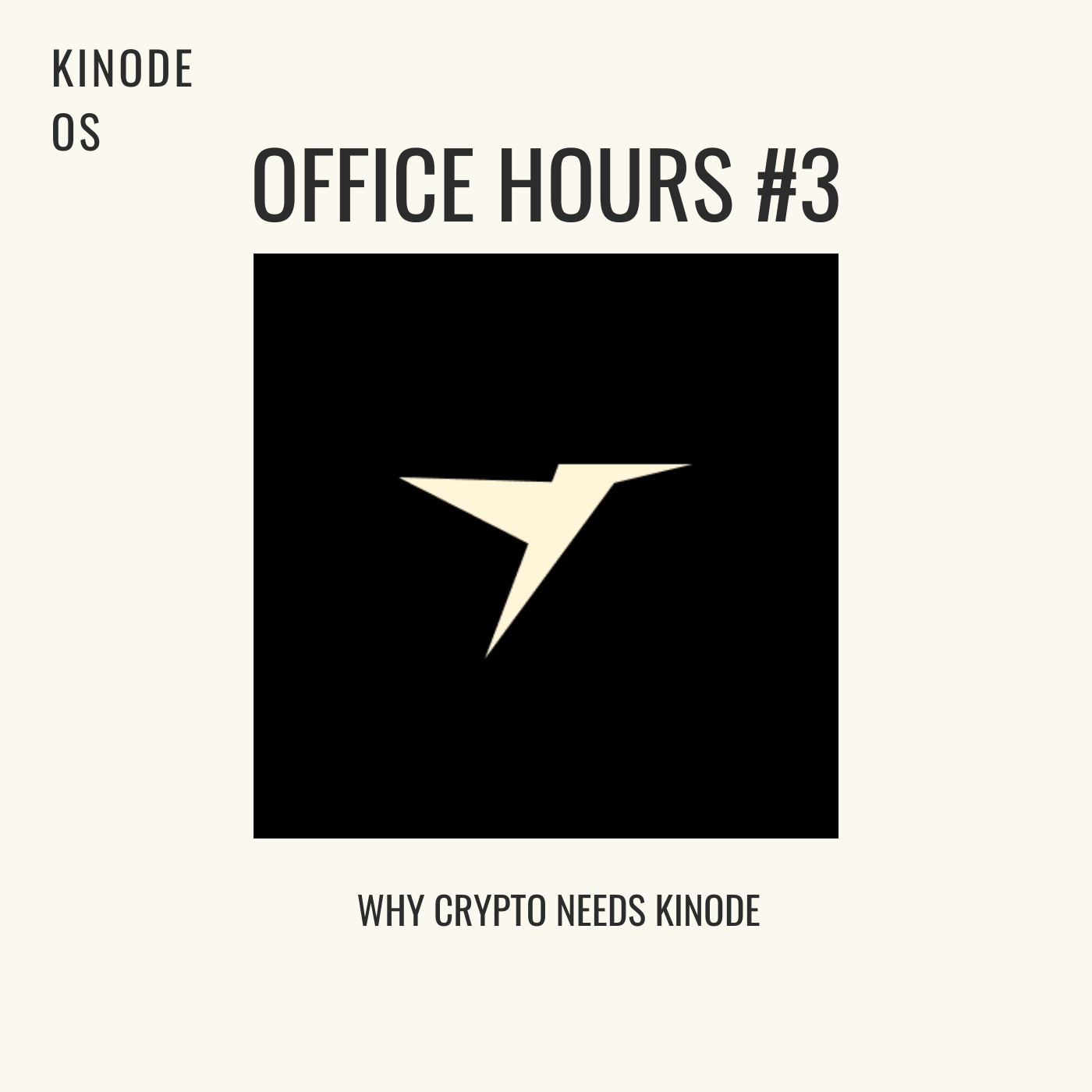Discover Kinode Office Hours
Kinode Office Hours

Kinode Office Hours
Author: Bichul Ritsen and Habsul Rignyr
Subscribed: 14Played: 300Subscribe
Share
© Bichul Ritsen 2022
Description
Kinode Office Hours (Formerly The Network Age Podcast) reposts Kinode's weekly Twitter/X space for RSS-preferrers. Join team members @petruch10, @basileSportif, @m_e_doria, and guests to learn what's what in the world of @KinodeOS.
63 Episodes
Reverse
In this session of Kinode Office Hours, Basile and Doria discuss the launch of Kinode Genesis NFTs, emphasizing their benefits such as free hosting and access to new tools on the Kinode platform. We highlight the ease of use for developers, including features like SSH access for seamless app deployment. We also showcase several applications available on the Kinode App Store, including the MemeDeck app, Barter, the AI-enabled NFT trader, the Twitter feed Filter, and a contact management app. Develop on Kinode: https://book.kinode.org Basile: https://twitter.com/basileSportif Doria: https://twitter.com/m_e_doria Join our Discord: https://discord.gg/guqKRnPup7
In this episode of Kinode Office Hours, we discuss the Kinode Command Center. Command Center serves as an aggregator of various API keys, simplifying the development of apps that leverage multiple APIs. We explore the integration of Telegram, OpenAI, and Groq, as well as future expansions to include APIs like CoinMarketCap. The episode highlights the ease of developing modular apps with the Command Center and its potential for creating seamless, composable applications. We also touch on the challenges and benefits of using Telegram as a frontend and the importance of a unified approach to messaging between processes. Develop on Kinode: https://book.kinode.orgBasile: https://twitter.com/basileSportifDoria: https://twitter.com/m_e_doriaJoin our Discord: https://discord.gg/guqKRnPup7
In this week's episode of Kinode Office Hours, we discuss the distinct approach Kinode takes towards decentralized computing, emphasizing that Kinode is not a blockchain. We talk about the nuances of Kinode's hybrid architecture, integrating both on-chain and off-chain elements. And we explore the advantages of this hybrid model in addressing scalability and efficiency challenges that blockchain applications face. Key topics include the development environment, RPC endpoints, the unique off-chain functionalities Kinode offers, and the potential for creating rich applications beyond the limitations of traditional blockchain systems.Develop on Kinode: https://book.kinode.orgBasile: https://twitter.com/basileSportifDoria: https://twitter.com/m_e_doriaJoin our Discord: https://discord.gg/guqKRnPup7
In this week's episode of Office Hours, we discuss hosted Kinodes and explore why software deployment is a crucial aspect of the tech landscape. Jonathan, the key developer behind our hosting framework, shares insights on its development and current testing phases. We cover the transition from traditional cloud services to decentralized computing, the importance of easy node deployment, and the unique advantages our hosting solution offers over bare metal setups and VPS. Develop on Kinode: https://book.kinode.orgBasile: https://twitter.com/basileSportifDoria: https://twitter.com/m_e_doriaJoin our Discord: https://discord.gg/guqKRnPup7
Welcome to the latest Kinode Office Hours. This week, we talk about a tool designed to enhance your Twitter experience—the Kinode Twitter Filter. Now in the Kinode App Store and as a Chrome extension, Filter employs artificial intelligence to customize your Twitter feed according to your preferences. Join us as we explore the inner workings of this filter, unveil its features, and even give you a sneak peek at what the future holds. Develop on Kinode: https://book.kinode.orgProject Lead Basile: https://twitter.com/basileSportifLead Dev Doria: https://twitter.com/m_e_doriaJoin our Discord: https://discord.gg/guqKRnPup7
This week, we speak with Claudia Richoux, the CEO of Banyan. Our conversation focuses on Banyan's innovative distributed file system, which aims to provide secure, affordable, and decentralized data storage solutions. Claudia explains the concept of a "data wallet" and outlines how Banyan's technology integrates with decentralized networks to improve data handling, security, and cost-effectiveness compared to traditional cloud services. Banyan: https://twitter.com/BanyanComputer Develop on Kinode: https://book.kinode.org Project Lead Basile: https://twitter.com/basileSportif Lead Dev Doria: https://twitter.com/m_e_doria Join our Discord: https://discord.gg/guqKRnPup7
This week, we discuss how Kinode simplifies blockchain application development by abstracting away infrastructure setup, allowing developers to focus on core application logic. We highlight Goldfinger's zk-Rollup template and chess game as an example, noting how Kinode's architecture facilitates better UX and seamless composition of on-chain logic and off-chain interactions in a multi-rollup future. LinksDevelop on Kinode: https://book.kinode.orgProject Lead Basile: https://twitter.com/basileSportifLead Dev Doria: https://twitter.com/m_e_doriaDeveloper Goldfinger: https://twitter.com/golfinger_kinoJoin our Discord: https://discord.gg/guqKRnPup7
This week we discuss Barter, an LLM-powered NFT negotiator app built on Kinode. We discuss the app's functionality, creative "prompt hacking" possibilities, and broader implications. Barter allows users to set up a Telegram bot to automatically negotiate NFT sales based on customizable parameters. The discussion touches on the potential for AI to engage in financial transactions, the need for extensive testing around prompt injection risks, and the power of Kinode's permissionless and iterative development environment.LinksDevelop on Kinode: https://book.kinode.orgProject Lead Basile: https://twitter.com/basileSportifLead Dev Doria: https://twitter.com/m_e_doriaJoin our Discord: https://discord.gg/guqKRnPup7
In this week's Kinode Office Hours, we're joined by Trent from Holium to discuss their new project MemeDeck, a platform for AI-powered meme generation and curation. The conversation explores the nuances of building decentralized applications, and how Kinode's modular architecture allows developers to choose which components should be centralized versus decentralized for optimal user experience and scalability. Trent shares insights into Meme Deck's architecture, which leverages Kinode for user data storage and identity while relying on centralized services for compute-intensive tasks like meme generation and search. The team also dives into Holium's vision for a decentralized AI infrastructure, where users can contribute their GPU power to train models and execute tasks, earning rewards in the process. Basile and Doria emphasize the importance of ergonomics and the "build another app" principle in designing developer-friendly systems that can compete with centralized platforms. Tune in for a fascinating discussion on the future of decentralized AI, the power of memes, and the role of Kinode in enabling a new wave of Web3 applications.Develop on Kinode: https://book.kinode.orgHolium Corp: https://twitter.com/holiumcorpMemeDeck: https://twitter.com/MemeDeckAppProject Lead Basile: https://twitter.com/basileSportifLead Dev Doria: https://twitter.com/m_e_doriaJoin our Discord: https://discord.gg/guqKRnPup7
In this week's Kinode Office Hours, we dive into the philosophy and rationale behind Kinode's 0.6 release, a major milestone on the path to the highly-anticipated 1.0 version. We discuss the importance of achieving a stable, backwards-compatible API as early as possible in the development process. Drawing parallels to Ethereum's unwavering commitment to backwards compatibility, we highlight how this approach forces the team to build real applications from day one, ensuring that the system can actually support the intended use cases. Develop on Kinode: https://book.kinode.orgProject Lead Basile: https://twitter.com/basileSportifLead Dev Doria: https://twitter.com/m_e_doriaJoin our Discord: https://discord.gg/guqKRnPup7
In this week's Kinode Office Hours, we dive into the philosophy and rationale behind Kinode's 0.6 release, a major milestone on the path to the highly-anticipated 1.0 version. We discuss the importance of achieving a stable, backwards-compatible API as early as possible in the development process. Drawing parallels to Ethereum's unwavering commitment to backwards compatibility, we highlight how this approach forces the team to build real applications from day one, ensuring that the system can actually support the intended use cases. Develop on Kinode: https://book.kinode.orgProject Lead Basile: https://twitter.com/basileSportifLead Dev Doria: https://twitter.com/m_e_doriaJoin our Discord: https://discord.gg/guqKRnPup7
In this week's Kinode Office Hours, we take a deep dive into the future of blockchain scaling solutions. We explore a world where deploying a custom zkEVM rollup is as easy as spinning up a VPS, with Kinode providing the infrastructure to make it possible. The discussion covers the spectrum of Layer 2 solutions, from fully decentralized rollups to more centralized validiums and read-only "oracle" services. Throughout, the theme is lowering barriers to entry and enabling a proliferation of application-specific chains, all seamlessly integrated. Develop on Kinode: https://book.kinode.orgProject Lead Basile: https://twitter.com/basileSportifLead Dev Doria: https://twitter.com/m_e_doriaJoin our Discord: https://discord.gg/guqKRnPup7
In this week's Kinode Office Hours, we are joined by John Guibas from Succinct Labs to discuss the latest developments in zero-knowledge proofs and the SP1 prover system. Doria demonstrates a novel use case: a Telegram bot that generates proofs of messages within a group chat, enabling users to cryptographically verify the contents and timestamp of their conversations. The discussion explores the potential of SP1 to radically simplify the development of ZK applications by allowing developers to write programs in Rust, a popular and ergonomic language. John shares Succinct Labs' roadmap for reducing proving costs, integrating with the Ethereum Virtual Machine, and their long-term vision of a decentralized proving network. Basile and Doria share insights into how Kinode's peer-to-peer infrastructure could facilitate such a network and enable a new wave of privacy-preserving, ZK-powered applications. Develop on Kinode: https://book.kinode.orgjtguibas of SuccinctLabs: https://twitter.com/jtguibasProject Lead Basile: https://twitter.com/basileSportifLead Dev Doria: https://twitter.com/m_e_doriaJoin our Discord: https://discord.gg/guqKRnPup7
This week, we outline Kinode as not just another blockchain ecosystem but a chain integrator, emphasizing its capability to bridge on-chain and off-chain computations. We discuss the architectural and technological innovations Kinode brings to the table, notably its flexibility in integrating with various blockchain layers, enhancing off-chain computations, and the potential to streamline decentralized applications (DApps) development.Develop on KinodeProject Lead BasileLead Dev DoriaJoin our Discord, where all the devs hang out.
The Kinode Team discuss creating a platform that allows for the publishing, installation, reviewing, and forking of software packages in a decentralized manner. We cover governance and the potential for software monetization. And we outline the technical architecture, including the use of smart contracts, NFTs for package ownership rights, and the challenges and solutions for ensuring software integrity and authenticity. The conversation also touches on the broader implications of decentralized software distribution for developer freedom, governance, and the evolution of decentralized applications (DApps).Start developing on Kinode here.Join our Discord, where the whole team hangs out.Project Lead BasileLead Dev DoriaDeveloper Goldfinger
We're using The Network Age's distribution channel to bring our weekly X (Twitter) spaces to RSS! While you can catch us on our X presence every Thursday at noon Eastern live, where you can participate by asking questions about Kinode, we'll also start bringing the recordings to RSS for those of you who like that medium.Here's the first of these Office Hours with @basileSportif and @m_e_doria.
This week we speak with Basile Genève, project lead of Kinode OS. We discuss our pivot from Urbit (and the name Uqbar), the main features of Kinode, and what you can expect from the future. We also say goodbye to The Network Age and invite you to join us in our other channels.Timestamps00:01 - Kinode OS with a name change backstory.03:53 - Rebranding.06:20 - Pivoting a decentralized project to better realize goals.09:14 - Rewriting the kernel and using wasm for decentralized app development.14:24 - "just works" in tech, reliability, and user experience.17:09 - Decentralized OS development and standards.23:46 - Network architecture and robustness.26:43 - Software robustness and resilience.30:16 - Decentralized networks and their potential for software deployment.37:12 - Integrating AI with decentralized computing resources.40:15 - Decentralized AI and personal nodes.46:41 - Performance of Kinode vs other programming languages.49:54 - Decentralized operating system development timeline and features.Contact UsEdgarJoshBasileThe Kinode OS discussion is happening on Discord
This week, it's Spreek: crypto Twitter's own crypto rug early warning system. He discusses his work in on-chain monitoring and stopping hacks in the DeFi industry, his experiences of saving people from potential losses, the highlights and lowlights of DeFi Summer, the challenges of smart contract security, and more. We've also got great advice on how to miss out on generational wealth. Another perfect episode you won't want to miss.Timestamps00:00 Introduction and Background03:00 Getting Started with On-Chain Monitoring08:20 Highlights and Lowlights of DeFi Summer14:08 The Challenges of Smart Contract Security19:26 Building a Community and Interacting with the Crypto Space25:32 The Future of DeFi and Investing in Crypto28:49 Balancing Risk and Opportunities in the Crypto Market32:37 Lessons Learned from Rugs and Scams1:08:37 The Lesson of Life and Crypto1:09:14 Generational Wealth and Selling1:09:56 Holding Ground and Hedging1:10:42 Wrapping It UpMentionsCasa (for seedless multisigs)Rabby walletContactSpreekBichulHabsul
This week we speak with L0m3z of Passage Prize, Passage Publishing, and Twitter fame. Our theme: what's so wrong with legacy writing and publishing and will people actually buy books again if you just start your own publishing house and give them what they want to read? This is an extra special episode you won't want to miss.Timestamps00:00 - Introduction & decentralized publishing and art creation.09:20 - The success of a dissident art publishing project.15:00 - Literature's decline and gatekeeping.20:06 - Gender imbalance in literature and publishing.28:27 - Art, politics, and publishing with a rightist perspective.35:33 - Cultural homogenization and the loss of high art in democratized societies.43:28 - Preserving cultural distinctness in art and literature.48:21 - Language loss and cultural heritage.54:08 - Literary voices and the Passage Prize.58:22 - Writing, creativity, and personal life.1:05:05 - Writing, publishing, and authenticity.1:10:40 - Decentralized publishing and supporting new writers.MentionsPassage PublishingThe Passage PrizeMan's World MagazineContactL0m3zHabsul RignyrBichul RitsenIf you liked this episode (a person of taste!), please go immediately to your podcast provider of choice and leave 5 star reviews of erudition and wit.
On this extra special episode, the boys are joined by Grin, founder and CTO of LBRY and tech lead for Cabin DAO. They talk about fighting the SEC and losing but still WINNING, the LBRY blockchain and Odyssee video sharing platform, about finding friends online to VIBE with and maybe even move into together, and more! Don't miss it.Timestamps00:00 - Intro01:53 - The origins and development of the decentralized library platform, LBRY.06:02 - Decentralized video sharing platform Odyssey.09:26 - Decentralized video platform Odyssee's discoverability and content culture.16:17 - Curation and personalized content experiences.20:37 - LBRY's popularity and SEC lawsuit.29:33 - Crypto regulations and legal issues.41:33 - Building a network of modern villages using technology and community.49:35 - Novel ways to organize physical space and relationships through technology.52:58 - Debt, relationships, and community in a libertarian context.01:01:23 - Community-driven urban planning and sustainability.01:06:07 - Creating a virtual event platform.01:13:23 - Vibe.camp, a community-driven event.MentionsLBRYOdysseeCabinVibeCampHester M. Peirce's Statement of Dissent on LBRYContactGrinBichul RitsenHabsul Rignyr
























